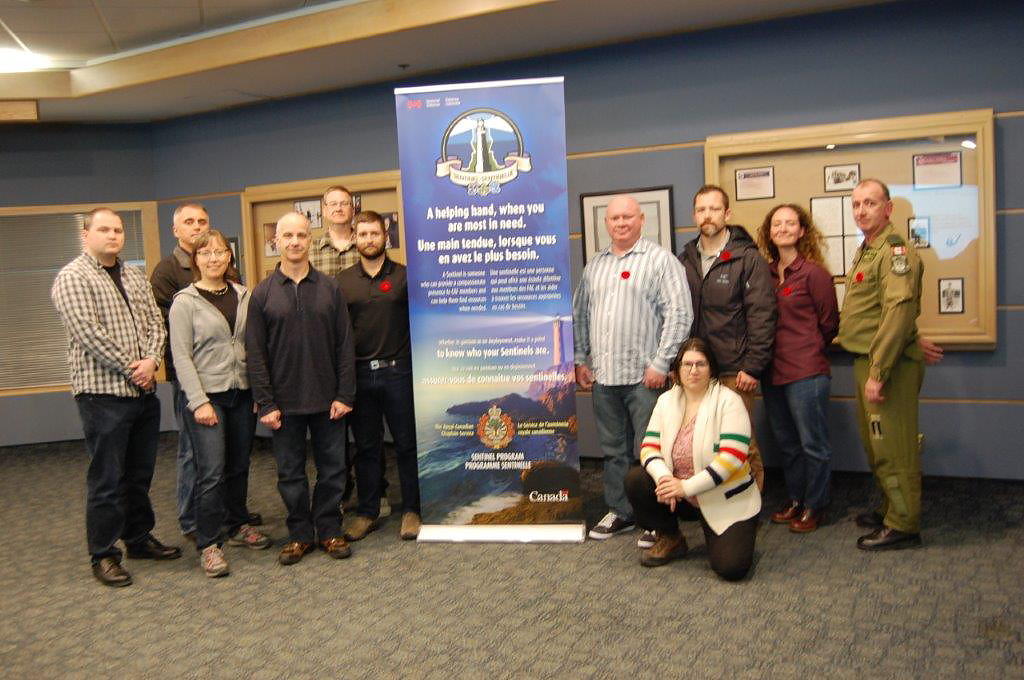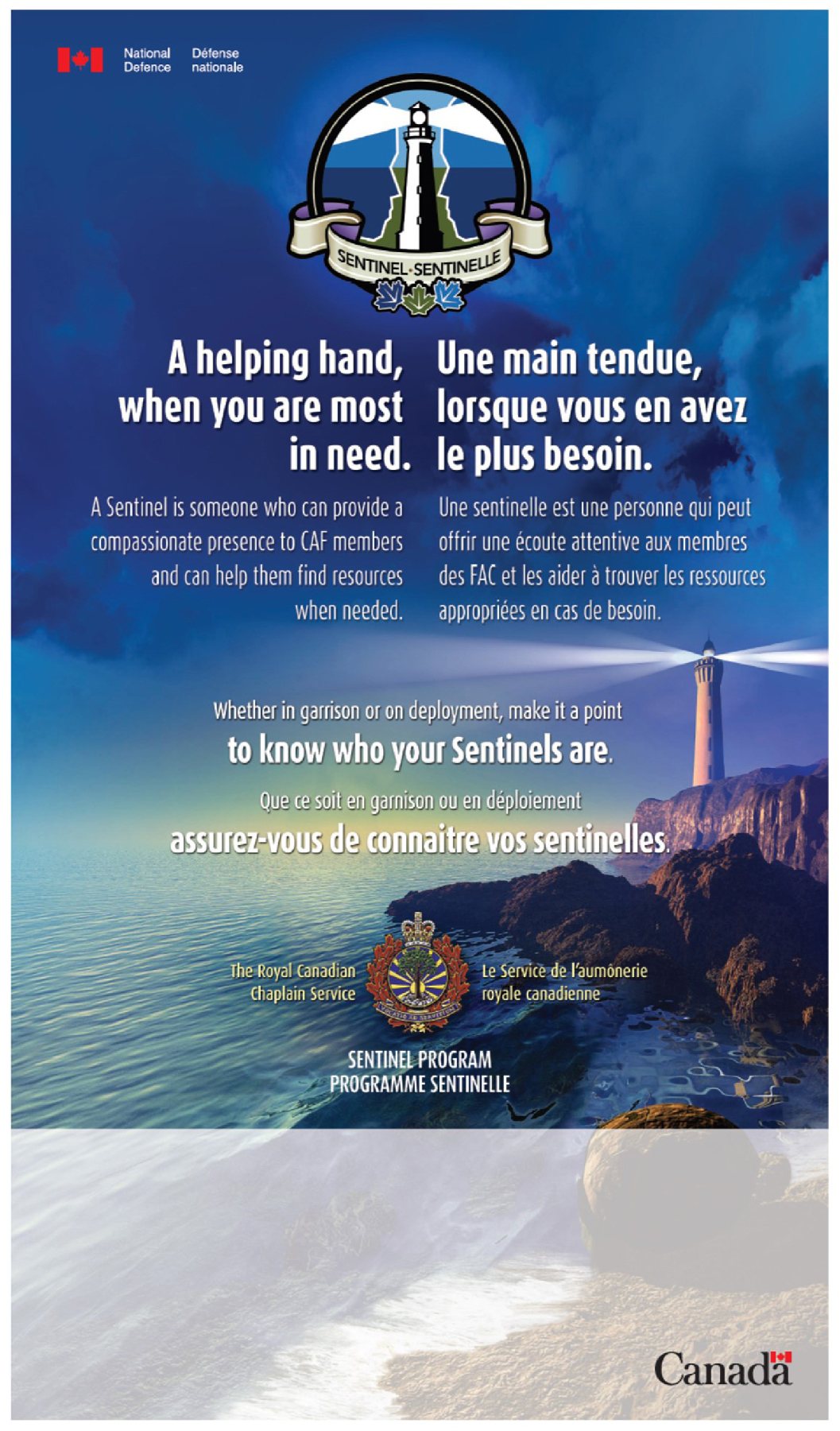Building a bridge over troubled waters: The Sentinel Program in practice
News Article / December 9, 2019
Click on the photo under “Image Gallery” to see more photos.
By Captain Bettina McCulloch-Drake
Not too long ago, in a galaxy not so far away, I came to a dark and lonely place.
A place where the angry, negative, self-doubting voice in my head was nearly successful in making me forget that there were things in life worth living for. That shame-laden, guilt-ridden questioning voice echoed in my ear for weeks, months even. It asked, no…more like demanded: “When is it going to be enough? When are you going to feel like you are enough?”
And while I struggled inside to regain some semblance of control over that threatening voice, most people likely had no clue that I was anything but what I appeared to be on the outside: a proud member of the Canadian Armed Forces (CAF), a volunteer within my community, a busy mother of two young girls, and a loving partner to one of the smartest, funniest men I know.
What they likely did not see is how I used being busy to distract myself from what I was feeling inside: the growth of an unfathomable void in the pit of my being.
But—despite the lies I tried to tell myself—my husband, my children, and my closest co-workers knew that something was off.
They were the first to ask me: “Are you okay?” “How are you doing today?” They were the first to express their willingness to listen: “I am here if you need someone to talk to.” “Want to go somewhere quiet to talk?”
And they were the first to step up and connect me with the help I needed when I finally gave up pretending that everything was fine: “I think the chaplains can help. Let’s go and see them.”
“I’ll take you to Health Services and wait with you until you can receive help.”
According to Lieutenant (Navy) David Godkin, 1 Canadian Air Division Headquarters’ assistant chaplain, “We have the closest connection to those we spend more time with, like our families and co-workers. We usually see these individuals as non-threatening and therefore tend to trust them to listen when we need to ‘get something off our chests’.”
I can attest that without the help of my co-workers, the support of my chain of command, and the unwavering love of my family, I do not know if I would be where I am now, a little over a year since I was admitted to a hospital and treated for depression.
I could have easily become part of a sad statistic, but I was lucky.
Lucky… Why do I describe it that way?
I describe myself as lucky because we are still far away from everyone being able to get the help they need when they need it. To put it another way, not everyone is fortunate enough to have the support of their supervisors, their teachers, their co-workers, their family or their friends.
Can you imagine being told, by someone you trust, that what you are feeling is “all in your head” and that you should just “get over it”? And yet, that is what is happening in workplaces, in schools, in homes and throughout our society.
It is easy for us to understand the pain associated with something like a broken bone, or empathize with someone going through cancer treatment. But, it is hard to understand why someone who appears to have everything is finding it difficult to connect, finding it difficult to function, or finding it difficult to feel joy in the everyday.
And even if we cannot truly understand what someone is going through, being available to listen and being a supportive presence can make a big difference.
We can all make a difference.
“Most of us already have the ability and the desire to help others, especially in difficult times,” Lieutenant (N) Godkin says. “You don’t need any special training to be a good neighbour or a good co-worker.”
And yet, there are people within the Canadian Armed Forces (CAF) who have dedicated themselves to being a comforting presence, a non-judgmental ear, and a bridge over troubled waters helping to connect those in distress with the help they need.
These people are the Sentinels, a volunteer network of peer-support persons who are trained by and accountable to CAF chaplains wherever CAF members are employed and deployed.
First introduced by the Canadian Army in 2007 by the 2nd Canadian Division in Valcartier, Québec, the Sentinel Program has since expanded to include the Royal Canadian Navy and the Royal Canadian Air Force (RCAF).
“At first, we were overwhelmed by the support shown by the chain of command,” admits Lieutenant-Colonel Michel Dion, 1 Canadian Air Division’s senior chaplain. “But, it became quickly evident that the Sentinel Program filled a need within the RCAF. The beauty of this simple, but powerful, program is that it empowers people to connect with others, which in turn creates a stronger, more cohesive and operationally ready unit.
“The connections we make today are especially important during times of the year when some of us may feel increasingly isolated, stressed or sad,“ he adds. “As a community, it is important that we look out for and help take care of each other.”
Are you a Canadian Armed Forces member or family member who is interested speaking with a good listener, or in learning more about the Sentinel Program? Please contact your wing or base chaplain’s office.
Captain Bettina McCulloch-Drake serves at 1 Canadian Air Division Headquarters in Winnipeg, Manitoba.

